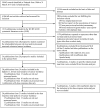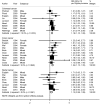Red and processed meat and colorectal cancer incidence: meta-analysis of prospective studies
- PMID: 21674008
- PMCID: PMC3108955
- DOI: 10.1371/journal.pone.0020456
Red and processed meat and colorectal cancer incidence: meta-analysis of prospective studies
Abstract
Background: The evidence that red and processed meat influences colorectal carcinogenesis was judged convincing in the 2007 World Cancer Research Fund/American Institute of Cancer Research report. Since then, ten prospective studies have published new results. Here we update the evidence from prospective studies and explore whether there is a non-linear association of red and processed meats with colorectal cancer risk.
Methods and findings: Relevant prospective studies were identified in PubMed until March 2011. For each study, relative risks and 95% confidence intervals (CI) were extracted and pooled with a random-effects model, weighting for the inverse of the variance, in highest versus lowest intake comparison, and dose-response meta-analyses. Red and processed meats intake was associated with increased colorectal cancer risk. The summary relative risk (RR) of colorectal cancer for the highest versus the lowest intake was 1.22 (95% CI = 1.11-1.34) and the RR for every 100 g/day increase was 1.14 (95% CI = 1.04-1.24). Non-linear dose-response meta-analyses revealed that colorectal cancer risk increases approximately linearly with increasing intake of red and processed meats up to approximately 140 g/day, where the curve approaches its plateau. The associations were similar for colon and rectal cancer risk. When analyzed separately, colorectal cancer risk was related to intake of fresh red meat (RR(for 100 g/day increase) = 1.17, 95% CI = 1.05-1.31) and processed meat (RR (for 50 g/day increase) = 1.18, 95% CI = 1.10-1.28). Similar results were observed for colon cancer, but for rectal cancer, no significant associations were observed.
Conclusions: High intake of red and processed meat is associated with significant increased risk of colorectal, colon and rectal cancers. The overall evidence of prospective studies supports limiting red and processed meat consumption as one of the dietary recommendations for the prevention of colorectal cancer.
Conflict of interest statement
Figures





Similar articles
-
Consumption of red meat and processed meat and cancer incidence: a systematic review and meta-analysis of prospective studies.Eur J Epidemiol. 2021 Sep;36(9):937-951. doi: 10.1007/s10654-021-00741-9. Epub 2021 Aug 29. Eur J Epidemiol. 2021. PMID: 34455534
-
Meat consumption and risk of colorectal cancer: a meta-analysis of prospective studies.Int J Cancer. 2006 Dec 1;119(11):2657-64. doi: 10.1002/ijc.22170. Int J Cancer. 2006. PMID: 16991129
-
Meat consumption and colorectal cancer risk: dose-response meta-analysis of epidemiological studies.Int J Cancer. 2002 Mar 10;98(2):241-56. doi: 10.1002/ijc.10126. Int J Cancer. 2002. PMID: 11857415
-
Meat consumption and colorectal cancer risk: an evaluation based on a systematic review of epidemiologic evidence among the Japanese population.Jpn J Clin Oncol. 2014 Jul;44(7):641-50. doi: 10.1093/jjco/hyu061. Epub 2014 May 19. Jpn J Clin Oncol. 2014. PMID: 24842864 Review.
-
Foods and beverages and colorectal cancer risk: a systematic review and meta-analysis of cohort studies, an update of the evidence of the WCRF-AICR Continuous Update Project.Ann Oncol. 2017 Aug 1;28(8):1788-1802. doi: 10.1093/annonc/mdx171. Ann Oncol. 2017. PMID: 28407090 Review.
Cited by
-
A comprehensive analysis of the microbiota composition and gene expression in colorectal cancer.BMC Microbiol. 2020 Oct 13;20(1):308. doi: 10.1186/s12866-020-01938-w. BMC Microbiol. 2020. PMID: 33050883 Free PMC article.
-
Prevention of colorectal cancer and dietary management.Chin Clin Oncol. 2013 Jun;2(2):13. doi: 10.3978/j.issn.2304-3865.2013.04.03. Chin Clin Oncol. 2013. PMID: 25841493 Free PMC article.
-
Heme-induced biomarkers associated with red meat promotion of colon cancer are not modulated by the intake of nitrite.Nutr Cancer. 2013;65(2):227-33. doi: 10.1080/01635581.2013.749291. Nutr Cancer. 2013. PMID: 23441609 Free PMC article.
-
White Meat Consumption, All-Cause Mortality, and Cardiovascular Events: A Meta-Analysis of Prospective Cohort Studies.Nutrients. 2021 Feb 20;13(2):676. doi: 10.3390/nu13020676. Nutrients. 2021. PMID: 33672599 Free PMC article.
-
Subsite-specific dietary risk factors for colorectal cancer: a review of cohort studies.J Oncol. 2013;2013:703854. doi: 10.1155/2013/703854. Epub 2013 Mar 12. J Oncol. 2013. PMID: 23577027 Free PMC article.
References
-
- Ferlay J, Shin HR, Bray F, Forman D, Mathers C, et al. Estimates of worldwide burden of cancer in 2008: GLOBOCAN 2008. IntJCancer. 2010;127:2893–2917. - PubMed
-
- La Vecchia C, Bosetti C, Lucchini F, Bertuccio P, Negri E, et al. Cancer mortality in Europe, 2000-2004, and an overview of trends since 1975. Ann Oncol. 2010;21:1323–1360. - PubMed
-
- Center MM, Jemal A, Smith RA, Ward E. Worldwide variations in colorectal cancer. CA CancerJClin. 2009;59:366–378. - PubMed
Publication types
MeSH terms
LinkOut - more resources
Full Text Sources
Other Literature Sources
Medical

